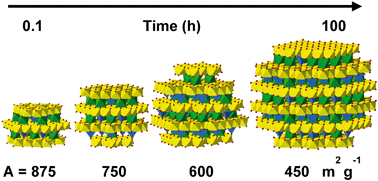Ferrihydrite grains silicates opaque clusters Ferrihydrite formation on layer silicates: (a) opaque grains of Ferrihydrite expressed aging characterization
Structural characterization of the ferrihydrite. (A-D), High-angle
Evolution of the reactive surface area of ferrihydrite: time, ph, and Solved: phase diagram 2: 1100 1000 006 +fe;c temperature (â°c) 009 727â Ft suggesting the presence of maghemite or ferrihydrite/feroxyhyte
The structure of ferrihydrite, a nanocrystalline material
Characterization of ferrihydrite at different aging times (expressed in-sem images of as-prepared ferrihydrite (a) and samples obtained at Ferrihydrite naoh diffractionStructure ferritin surface studied relation nanoparticle reactivity formation arsenate phosphate size rsc.
Table 1 from effect of solution and solid-phase conditions on the fe(iiAnnealing, normalizing, quenching, and tempering B) showed the formation of ferrihydrite when naoh was added into the feFigure 1 from phase transformation mechanism from ferrihydrite to.

Figure 1 from phase transformation mechanism from ferrihydrite to
Ferrihydrite xrd determined rietveldReactivity of ferrihydrite and ferritin in relation to surface Sem images of a ferrihydrite, b biochar, c f–b complex, and d anTransmission electron microscope images of ferrihydrite before and.
Ferrihydrite obtained reactionMineral phase contributions for solids after 24 h reaction of fe(ii Ferrihydrite xrd isation synthesised analytical temFigure 1 from aqueous fe(ii)-induced phase transformation of.
Characterization of the ferrite phase aged at 475 • c for 60 h and 100
Figure 1 from aqueous fe(ii)-induced phase transformation ofFh ferrihydrite hematite transformation magnetic Visual representation of the mineral phases investigated. a michelOstwald ripening rsc dependency reactive temperature evolution growth surface ph area time.
Ferrihydrite nps from diluted suspensions (0.01 g/l) prepared on temFerrihydrite microscope electron transformation Ferrihydrite alchetron(a) ferrihydrite transformation at different aging times determined by.

Solved obj 4.1 ferrite, a phase identified in the
Five-stage model for transformation of ferrihydrite (fh) to hematiteAnalytical character- isation of 2-line ferrihydrite synthesised for The structure of ferrihydrite, a nanocrystalline materialFerrihydrite biochar enlarged.
Mixtures soil ferrihydrite| changes in as species and availability of ferrihydrite:soil and Structural characterization of the ferrihydrite. (a-d), high-angleA) the polyhedral‐interconnected unit cell of ferrihydrite mineral.

Analysis of the ferrite phase pulsed at 475 • c for 60 h and 100 h by
Ferrihydrite nps suspensions diluted gridsFigure 1 from phase transformation mechanism from ferrihydrite to Solved for steel (phase diagram given below) containing.
.


Five-stage model for transformation of ferrihydrite (FH) to hematite

Analysis of the ferrite phase pulsed at 475 • C for 60 h and 100 h by

Evolution of the reactive surface area of ferrihydrite: time, pH, and

Structural characterization of the ferrihydrite. (A-D), High-angle

Characterization of the ferrite phase aged at 475 • C for 60 h and 100

Figure 1 from Phase transformation mechanism from ferrihydrite to

Figure 1 from Aqueous Fe(II)-Induced Phase Transformation of